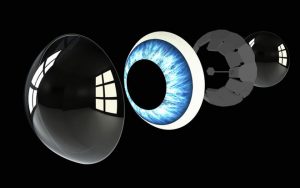Smart contact lenses are coming to eyes near you sometime in the next few years. The latest in wearable technology (think Apple Watch and FitBit) will be able to not only monitor your heart rate but will help you to see in the dark, take photos or videos, calculate distances, and even call up your calendar to see what is next on your schedule. The wearable tech comes in the form of smart contact lenses and will use augmented reality (AR) to allow wearers to access usable data with eye movements and gestures.
Mojo Vision, a Silicon Valley startup, showcased its smart contact lens last month at the CES 2020 conference in Las Vegas, Nevada. They are claiming that their smart contact lens, which covers the sclera (white of the eye, not just the iris), will contain a 14,000-ppi display (pixels per inch), the smallest, densest visual display available on the market. They are working with the Federal Drug Administration (FDA) and the Vista Center for the Blind and Visually Impaired to bring the product to market and hope to have it available for use in the medicine, public safety, and hospitality industries by 2022. The technology will correct refractive errors as contact lenses currently do, and it will greatly help those with low vision by helping to outline and define people and objects in the display. Don’t worry about the data cluttering up your field of vision, Mojo Lens will only display information when accessed, according to the company’s website.
Mojo Vision isn’t the only game in town: Samsung, Sony, Alcon, Google, and Sensimed SA have all been in the development of smart eyewear for some time. Some may remember Google’s foray into wearable tech with their Google Glass eyewear that debuted in 2013. That technology was aimed at the general population but was discontinued in 2015 due in large part, to the eyeglasses hefty $1,500 price tag. Google’s Verily company and Alcon halted their joint smart contact lens project aimed at sensing glucose levels in the tears of diabetic patients in late 2018. But Samsung just received a U.S. patent for smart contacts last summer, so the projected $7.2 billion market (by 2023) could begin to see some credible movement in the foreseeable future.
While the AR technology for consumers is still a little way off, the idea that smart contact lenses could potentially replace your smartphone (and your glasses/contacts) is an interesting one! Stay tuned.


